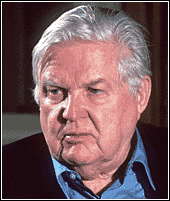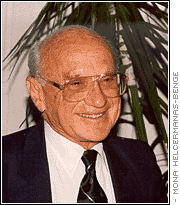Canada's
currency |

In 2nd week of December,
2000, the National Post ran a week long series of articles about the future
of the world currency system. [it is no longer on their website]
"In a National Post World
Exclusive, two Nobel economists - Milton Friedman and Robert Mundell -
debate one of the great unsettled economic issues of our time:
fixed or flexible exchange rates. Through an e-mail exchange organized
by the Financial Post, Friedman and Mundell debate often very different
views."
In the Dec 12th, 2000 Financial
Post, the subject debated was Canada's dollar.
This is are some very significant
issues here which are not covered so well in any textbook we could have
chosen for this course and since the issues also cover specifically Canadian
considerations, you are encouraged in the strongest way to read the following. |
Canada's
currency
fixed
or
floating
Canada's
currency
fixed
or
floating |
from the Tuesday Dec 12th
exchange
ROBERT MUNDELL
 |
ROBERT MUNDELL
"If for example, Canada
and the United States fixed exchange rates between their two dollars, Canadians
would gain much more than Americans because they would participate in a
currency area that had global dimensions. Also, the Canadian would
have a stable purchasing
power over a Continental
basket of goods and securities instead of the much smaller local Canadian
basket." |
MILTON FRIEDMAN
 |
MILTON FRIEDMAN
"Over the 30 years from 1970
to 2000, Canadian inflation has averaged about .5% a year higher than U.S.
inflation. That accounts for somewhat more than half of the decline in
the Canadian dollar relative to the U.S. dollar in the past 30 years. The
important point for present purposes is the remaining nearly half of the
decline in the Canadian dollar. That reflected different forces affecting
the Canadian than the U.S. economy. If the Canadian dollar had been rigidly
tied to the U.S. dollar, those differences would have required Canada to
deflate relative to the United States, with unfortunate consequences
for Canada that would have strained, to put it mildly, the trade relations
between the two countries, and have put strong pressure on Canada to devalue
or float. In my opinion, Canada was better served by a flexible rate in
those 30 years than it would have been by a fixed rate." |
|

